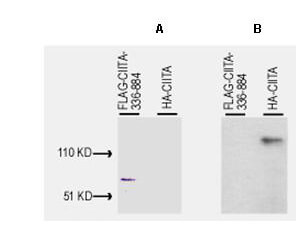Anti-CIITA aa 1-333 (RABBIT) Antibody
CIITA Antibody
- SPECIFICATION
- CITATIONS
- PROTOCOLS
- BACKGROUND

| Host | Rabbit |
|---|---|
| Conjugate | Unconjugated |
| Target Species | Human |
| Reactivity | Human |
| Clonality | Polyclonal |
Application
| WB, E, I, LCI |
| Application Note | Anti-CIITA antibody has been tested in western blot. For immunoblotting a 1:500 dilution is recommended. Researchers should determine optimal titers for other applications. |
| Physical State | Liquid (sterile filtered) |
| Immunogen | The immunogen used for this study was a bacterially produced recombinant FLAG-CIITA corresponding to amino acids 1 through 333 of the human protein. |
| Preservative | 0.01% (w/v) Sodium Azide |
| Gene ID | 4261 |
|---|---|
| Other Names | 4261 |
| Purity | Anti-CIITA antibody was prepared from monospecific antiserum by delipidation and defibrination. |
| Storage Condition | Store vial at -20° C prior to opening. Aliquot contents and freeze at -20° C or below for extended storage. Avoid cycles of freezing and thawing. Centrifuge product if not completely clear after standing at room temperature. This product is stable for several weeks at 4° C as an undiluted liquid. Dilute only prior to immediate use. |
| Precautions Note | This product is for research use only and is not intended for therapeutic or diagnostic applications. |
| Name | CIITA (HGNC:7067) |
|---|---|
| Synonyms | MHC2TA |
| Function | Essential for transcriptional activity of the HLA class II promoter; activation is via the proximal promoter (PubMed:16600381, PubMed:17493635, PubMed:7749984, PubMed:8402893). Does not bind DNA (PubMed:16600381, PubMed:17493635, PubMed:7749984, PubMed:8402893). May act in a coactivator-like fashion through protein-protein interactions by contacting factors binding to the proximal MHC class II promoter, to elements of the transcription machinery, or both PubMed:8402893, PubMed:7749984, (PubMed:16600381, PubMed:17493635). Alternatively it may activate HLA class II transcription by modifying proteins that bind to the MHC class II promoter (PubMed:16600381, PubMed:17493635, PubMed:7749984, PubMed:8402893). Also mediates enhanced MHC class I transcription; the promoter element requirements for CIITA-mediated transcription are distinct from those of constitutive MHC class I transcription, and CIITA can functionally replace TAF1 at these genes. Activates CD74 transcription (PubMed:32855215). Exhibits intrinsic GTP- stimulated acetyltransferase activity (PubMed:11172716). Exhibits serine/threonine protein kinase activity: can phosphorylate the TFIID component TAF7, the RAP74 subunit of the general transcription factor TFIIF, histone H2B at 'Ser-37' and other histones (in vitro) (PubMed:24036077). Has antiviral activity against Ebola virus and coronaviruses, including SARS-CoV-2 (PubMed:32855215). Induces resistance by up-regulation of the p41 isoform of CD74, which blocks cathepsin-mediated cleavage of viral glycoproteins, thereby preventing viral fusion (PubMed:32855215). |
| Cellular Location | Nucleus. Nucleus, PML body. Note=Recruited to PML body by PML |

Thousands of laboratories across the world have published research that depended on the performance of antibodies from Abcepta to advance their research. Check out links to articles that cite our products in major peer-reviewed journals, organized by research category.
info@abcepta.com, and receive a free "I Love Antibodies" mug.
Provided below are standard protocols that you may find useful for product applications.
Background
Anti-CIITA antibody detects CIITA. The transactivator CIITA regulates basal and interferon-induced expression of Major Histocompatibility Complex class II genes. CIITA restores expression of all MHC class II gene expression in mutant cells and corrects regulatory defects of MHC class II genes. Antibodies to this transactivator are useful in the study of diseases of pathological MHC class II expression. Antigen can be obtained from Raji cell lysates. Typically levels of CIITA expression are too low to detect endogenous levels of protein expression. Transiently transfected cells are usually employed to study this transcription factor.
If you have used an Abcepta product and would like to share how it has performed, please click on the "Submit Review" button and provide the requested information. Our staff will examine and post your review and contact you if needed.
If you have any additional inquiries please email technical services at tech@abcepta.com.













 Foundational characteristics of cancer include proliferation, angiogenesis, migration, evasion of apoptosis, and cellular immortality. Find key markers for these cellular processes and antibodies to detect them.
Foundational characteristics of cancer include proliferation, angiogenesis, migration, evasion of apoptosis, and cellular immortality. Find key markers for these cellular processes and antibodies to detect them. The SUMOplot™ Analysis Program predicts and scores sumoylation sites in your protein. SUMOylation is a post-translational modification involved in various cellular processes, such as nuclear-cytosolic transport, transcriptional regulation, apoptosis, protein stability, response to stress, and progression through the cell cycle.
The SUMOplot™ Analysis Program predicts and scores sumoylation sites in your protein. SUMOylation is a post-translational modification involved in various cellular processes, such as nuclear-cytosolic transport, transcriptional regulation, apoptosis, protein stability, response to stress, and progression through the cell cycle. The Autophagy Receptor Motif Plotter predicts and scores autophagy receptor binding sites in your protein. Identifying proteins connected to this pathway is critical to understanding the role of autophagy in physiological as well as pathological processes such as development, differentiation, neurodegenerative diseases, stress, infection, and cancer.
The Autophagy Receptor Motif Plotter predicts and scores autophagy receptor binding sites in your protein. Identifying proteins connected to this pathway is critical to understanding the role of autophagy in physiological as well as pathological processes such as development, differentiation, neurodegenerative diseases, stress, infection, and cancer.


